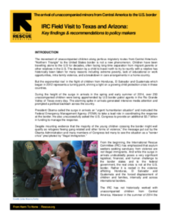In an effort to understand the situation of unaccompanied minors crossing the Unites States border and the exponential rise in the flight of children from Honduras, El Salvador and Guatemala which began in 2012, the International Rescue Committee has published this report from a field visit to Texas and Arizona. The report finds that messages from the Obama Administration and members of Congress has misled many to believe the situation to be a “border crisis” precipitated by “illegal immigration,” despite mounting evidence that the majority of the young children crossing the border might well qualify as refugees fleeing gang-related and other forms of violence.
The purpose of the assessment was to better understand the root causes of the flight of so many children to the U.S., their needs, and the problems that have hampered the U.S. government’s response. This report provides a summary of the findings and presents recommendations informed by the field assessment which are aimed to help policy makers improve the current and future response to the arrival of unaccompanied children from Central America to the United States.
The IRC team identified six trends in relation to causes of the flight and violence experienced by children from Honduras, El Salvador and Guatemala. The IRC team found that children are often targets of violence in these countries, that violence is spreading beyond urban communities in Central America, and that children feel unprotected by local authorities who are seen as increasingly complicit in organized crime. Girls and younger children, according to the report, are increasingly targeted for violence and parental absence due to migration increases children’s vulnerability. These trends, says the report, are an indication of a growing child protection crisis both in the US and Central America as well as a growing crisis of sexual and gender-based violence in the children’s countries of origin.
The report urges U.S. policymakers to expand monitoring and support services for children who enter into U.C. communities, not to “chip away at due process and the right to seek asylum,” and to change the message they are sending to the public and mobilize the people of the U.S. to address the needs of these children.

